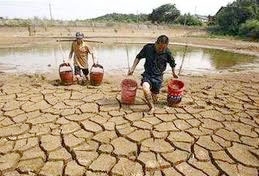Public awareness of climate change issues improves
 |
| illustration photo |
The statement was made by Truong Duc Tri, deputy head of the Department of Meteorology, Hydrology and Climate Change, at the Vietnam's third national workshop on climate change resilience held in Hanoi on October 18.
The workshop, which was hosted by Asian Cities Climate Change Resilience Network of 10 cities in India, Indonesia and Vietnam, discussed plans and activities taken in response to climate change in cities, and the lessons learnt.
Tri said the changes in awareness could be clearly seen at management level, including with state leaders and officials.
He pointed out, however, that although people could become more interested in the topic, it did not mean they gained better knowledge on the issue, adding that many people falsely thought of climate change as the reason for all weather's variables.
He said the government was now looking to boost communications regarding climate change in coastal areas and among youth at schools.
Concerning the implementation of the National Target Programme to Respond to Climate Change, which is launched in 2010, 10 localities so far have drafted action plans to tackle climate change effects, Tri said.
He pointed out, however, that plans die not offer adequate and reliable information about localities' climate change situations, which can only be found through comprehensive analyses and thorough research.
Tri added that ministers, departments and localities have submitted more than 600 planned projects to build climate change resilience to the government, with a total fund requested coming to about $10 billion, but most of these proposals lacks focus and orientation.
With regard to the construction sector's role in promoting climate change resilience, Luu Duc Cuong, director of the Centre for Environment Research and Planning in Urban and Rural Areas, said climate change issues hve not been integrated in urban development programmes and plans in a thorough manner, pointing out that urban planning should be the first thing taken into account in building climate change resilience, especially in coastal areas.
Marcus Moench, president of the Institute for Social and Environmental Transition, agreed with Tri. Moench said climate change must be addressed through strategies that respond to local conditions and social contexts.
Cuong said although the ways to deal with climate-related risks have been taken into account in construction projects, the approaches taken are not thorough and comprehensive.
What the stars mean:
★ Poor ★ ★ Promising ★★★ Good ★★★★ Very good ★★★★★ Exceptional
Related Contents
Latest News
More News
- Foreign fruits flood Vietnamese market (December 09, 2025 | 13:22)
- Vietnam’s fruit and vegetable exports reach $7.8 billion in first 11 months (December 05, 2025 | 13:50)
- Vietnam shapes next-generation carbon market (November 26, 2025 | 15:33)
- PM urges Ho Chi Minh City to innovate and remain Vietnam’s economic locomotive (November 26, 2025 | 15:29)
- Experts chart Vietnam's digital finance path: high hopes, high stakes (November 14, 2025 | 10:56)
- Vietnam’s seafood imports surge 30 per cent in first 10 months (November 10, 2025 | 19:35)
- Vietnam’s durian exports hit $1 billion milestone (October 30, 2025 | 17:41)
- Beyond borders: Sunhouse and new era of Vietnamese brands on Amazon (October 28, 2025 | 10:46)
- Record-breaking trade fair set to open in Hanoi (October 15, 2025 | 15:59)
- Timber sector seeks solutions to VAT refunds (October 14, 2025 | 18:58)

 Tag:
Tag:




















 Mobile Version
Mobile Version